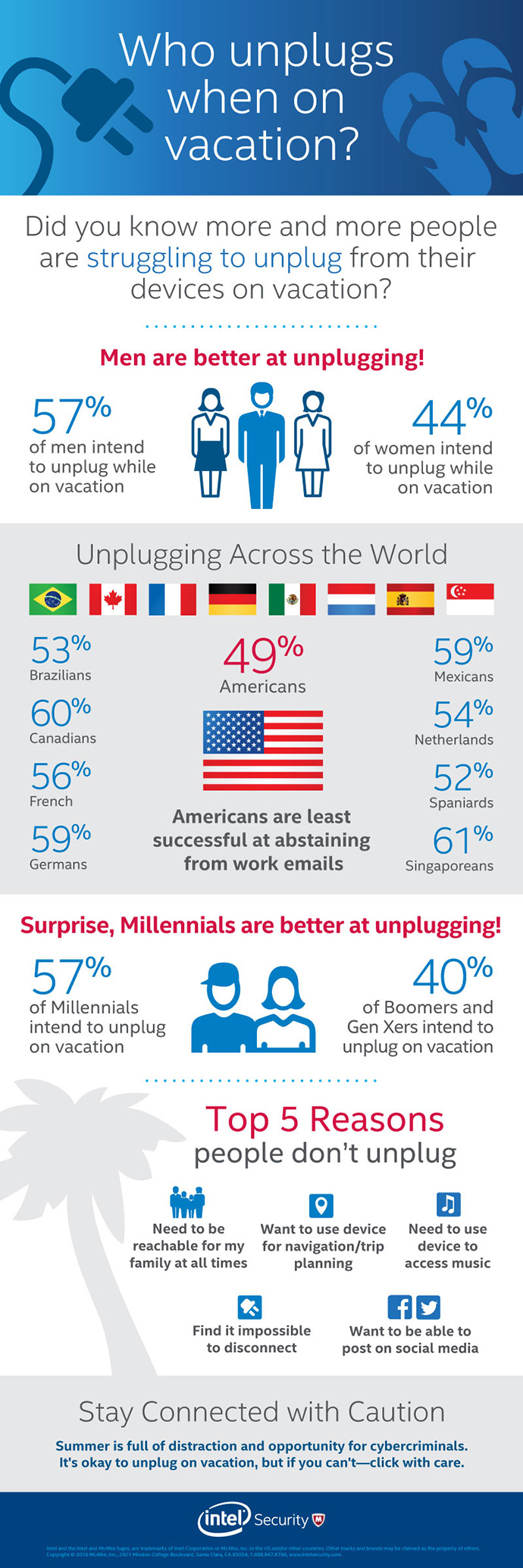It seems when it comes to social media abstinence during vacations, Canadians have an edge over our counterparts from other industrialized nations.
According to a study released by Intel Security, the makers of McAfee security software, Canadians were the most successful at staying away from social media use (61 per cent) while on vacation compared to French (60 per cent), Mexicans (54 per cent), Germans (54 per cent), Americans (53 per cent), Dutch (51 per cent), Brazilians (51 per cent), Spaniards (44 per cent) and Singaporeans (42 per cent).
Canadians were the second most successful at abstaining from work emails (60 per cent) while on vacation compared to Singaporeans (61 per cent), Germans (59 per cent), Mexicans (59 per cent), the French (56 per cent), Dutch (54 per cent), Brazilians (53 per cent), Spaniards (52 per cent), and Americans (49 per cent).
The study also showed that more than half (54 per cent) of Canadian participants who intended to unplug from their digital devices on vacation were unable to do so.
Yet almost three-quarters of Canadian survey participants said their vacation was more enjoyable after they unplugged their smartphones and tablets. Respondents reported being able to better absorb their surroundings and feel more connected to the people they were with.
The survey also seems to have busted a myth that the younger generation practically cannot survive without their devices. On the contrary, 51 per cent of Canadians in their 20s go on vacation with the intention to unplug, compared to only 35 per cent of Canadians in their 40s

Intel Security said it conducted the study, called “Digital Detox: Unplugging on Summer Vacation,” to better understand the ways consumers stay digitally connected while travelling.
The study also helped them understand the ways people may unknowingly be putting their personal identity and devices at risk, Intel Security said.
“Consumers rely on technology to stay connected to their physical and digital worlds – whether at work, home or on vacation,” Gary Davis, chief consumer security evangelist at Intel Security, said in a statement. “People are often quick to use devices on vacation to access sensitive information without considering the potential risk. As a result, it’s crucial to impart safe digital habits to help consumers stay more secure when travelling.”
The report warns travellers can become easy prey for savvy cybercriminals who count on human and device vulnerabilities to provide them with a point of access to consumers’ data and devices.
These cybercriminals can gain access to sensitive information via unsecured smartphones, laptops and even wearables, while also collecting data from social channels.
The report issued four tips to minimize security risks while travelling:
- Create Social Walls: Don’t post social media updates from your mobile device. Criminals are more able to monitor your whereabouts via social activity and take advantage of you when you have the weakest protection.
- Be Careful When You Share: Do not share publicly where or when you’ll be taking that relaxing vacation. Wait until you return home before posting all about it.
- Limit Wi-Fi and Bluetooth Use: As far as possible try avoiding connecting to unprotected Wi-Fi and Bluetooth devices. You should be especially careful when exchanging payment information. Make sure to update your Bluetooth and Wi-Fi history by removing previously ‘remembered’ wireless networks, like ‘cafewifi.’
- Check and Monitor Your Accounts: Keep an eye out for suspicious activity in your bank account history.







For reasons beyond our control, and for an undetermined period of time, our comment section is now closed. However, our social networks remain open to your contributions.